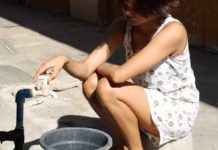BY IME SORNITO and GLENDA TAYONA
ILOILO – Demand for mosquito repellents has surged as dengue cases continue to rise. Stores here are running out of stocks.
From Jan. 1 to July 10, the City Health Office recorded 619 dengue cases with six deaths.
“Two months ago pa nga wala stocks,” an owner of a pharmacy on Aldeguer Street, City Proper told Panay News.
One of the mosquito repellents in demand is in the form of a lotion applied to the skin.
“Subong nagapangita ‘ko sang mga suppliers pero wala gid,” said the drugstore owner who asked not to be identified.
According to Dr. Mae Delmo, assistant CHO chief, the dengue figures as of Wednesday were 180 percent higher than those recorded from January to July 10 last year.
“Siguro tungod sang outbreak sang dengue damo nagapangita mosquito repellents. Pero wala gid kami ihatag,” according to the pharmacy owner.
In the 20 years that he has been in the business, his drugstore never experienced this high demand for mosquito repellents and the dearth in the supply of the product.
Another type of mosquito repellent people use is the so-called “mosquito coil” or mosquito-repelling incense.
The coil is usually held at the center of the spiral, suspending it in the air to allow continuous smoldering. Burning usually begins at the outer end of the spiral and progresses slowly toward the center, producing a mosquito-repellent smoke. The strong smell from the smoke may linger, permeating fabric and furniture.
But mosquito coils can be fire hazards. Their use has resulted in numerous accidental fires.
Yesterday, Mayor Jerry Treñas issued an executive order tasking all city government offices, schools and barangay councils to spearhead cleanup drives – a safer form of anti-dengue initiative.
“It is imperative for government offices, schools and barangays to take the lead,” he stressed.
Dengue is a mosquito-borne viral infection causing a severe flu-like illness that could sometimes be fatal. Its carriers are day-biting mosquitoes (Aedes albpictus and Aedes egypti) that live and breed and clean, stagnant water.
A saleslady of a mall in La Paz district said mosquito repellents, most especially in lotion form, were what customers usually sought out. Sales stated to pick up last month, the start of the rainy season.
Dengue, though now a year-round illness, has been associated with the rainy season because of dengue mosquitoes that live and breed in clear, stagnant water.
Thirty-three-year-old mother Genevy Pormillos told Panay News she wanted to buy a lotion mosquito repellent at CityMall in Barangay Ungka, Pavia, Iloilo but could not find any. She was told all the stocks were sold out.
Pormillos said she wanted to protect her two children – a four-year-old and a two-year-old – from dengue.
A big mall in Mandurriao, Iloilo City confirmed yesterday running out of stocks, too. Customers bought in bulk, a sales representative said though she declined to be identified for not having the authority to speak on the matter.
According to the City Health Office, the district of Jaro has the most number of cases (168) followed by Molo (113), Mandurriao (87), City Proper (74), La Paz (72), Arevalo (66), and Lapuz (39). Most of the patients were children below 10 years old.
In 2018, the total number of dengue cases recorded for the whole year was 883 with nine deaths.
The most recent dengue fatality was a five-year-old Kindergarten boy from Barangay Jibao-an Sur, Mandurriao. He died in a hospital on July 3.
The City Health Office also identified eight dengue hotspot barangays. These were Calumpang (15 cases), San Juan (23), So-oc (20), Q. Abeto (14), Navais (13), Baldoza (10), Balabago (11 cases with one death), and Sambag (10)./PN



